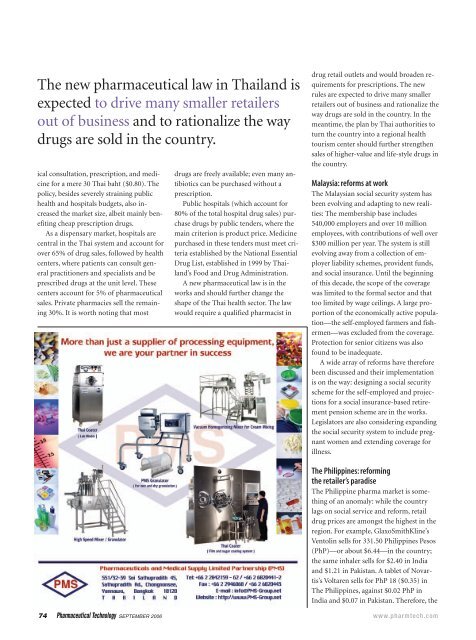An Executive Country Review: South East Asia An ... - EC Reviews
An Executive Country Review: South East Asia An ... - EC Reviews
An Executive Country Review: South East Asia An ... - EC Reviews
You also want an ePaper? Increase the reach of your titles
YUMPU automatically turns print PDFs into web optimized ePapers that Google loves.
The new pharmaceutical law in Thailand is<br />
expected to drive many smaller retailers<br />
out of business and to rationalize the way<br />
drugs are sold in the country.<br />
ical consultation, prescription, and medicine<br />
for a mere 30 Thai baht ($0.80). The<br />
policy, besides severely straining public<br />
health and hospitals budgets, also increased<br />
the market size, albeit mainly benefiting<br />
cheap prescription drugs.<br />
As a dispensary market, hospitals are<br />
central in the Thai system and account for<br />
over 65% of drug sales, followed by health<br />
centers, where patients can consult general<br />
practitioners and specialists and be<br />
prescribed drugs at the unit level. These<br />
centers account for 5% of pharmaceutical<br />
sales. Private pharmacies sell the remaining<br />
30%. It is worth noting that most<br />
drugs are freely available; even many antibiotics<br />
can be purchased without a<br />
prescription.<br />
Public hospitals (which account for<br />
80% of the total hospital drug sales) purchase<br />
drugs by public tenders, where the<br />
main criterion is product price. Medicine<br />
purchased in these tenders must meet criteria<br />
established by the National Essential<br />
Drug List, established in 1999 by Thailand’s<br />
Food and Drug Administration.<br />
A new pharmaceutical law is in the<br />
works and should further change the<br />
shape of the Thai health sector. The law<br />
would require a qualified pharmacist in<br />
drug retail outlets and would broaden requirements<br />
for prescriptions. The new<br />
rules are expected to drive many smaller<br />
retailers out of business and rationalize the<br />
way drugs are sold in the country. In the<br />
meantime, the plan by Thai authorities to<br />
turn the country into a regional health<br />
tourism center should further strengthen<br />
sales of higher-value and life-style drugs in<br />
the country.<br />
Malaysia: reforms at work<br />
The Malaysian social security system has<br />
been evolving and adapting to new realities:<br />
The membership base includes<br />
540,000 employers and over 10 million<br />
employees, with contributions of well over<br />
$300 million per year. The system is still<br />
evolving away from a collection of employer<br />
liability schemes, provident funds,<br />
and social insurance. Until the beginning<br />
of this decade, the scope of the coverage<br />
was limited to the formal sector and that<br />
too limited by wage ceilings. A large proportion<br />
of the economically active population—the<br />
self-employed farmers and fishermen—was<br />
excluded from the coverage.<br />
Protection for senior citizens was also<br />
found to be inadequate.<br />
A wide array of reforms have therefore<br />
been discussed and their implementation<br />
is on the way: designing a social security<br />
scheme for the self-employed and projections<br />
for a social insurance-based retirement<br />
pension scheme are in the works.<br />
Legislators are also considering expanding<br />
the social security system to include pregnant<br />
women and extending coverage for<br />
illness.<br />
The Philippines: reforming<br />
the retailer’s paradise<br />
The Philippine pharma market is something<br />
of an anomaly: while the country<br />
lags on social service and reform, retail<br />
drug prices are amongst the highest in the<br />
region. For example, GlaxoSmithKline’s<br />
Ventolin sells for 331.50 Philippines Pesos<br />
(PhP)—or about $6.44—in the country;<br />
the same inhaler sells for $2.40 in India<br />
and $1.21 in Pakistan. A tablet of Novartis’s<br />
Voltaren sells for PhP 18 ($0.35) in<br />
The Philippines, against $0.02 PhP in<br />
India and $0.07 in Pakistan. Therefore, the<br />
74 Pharmaceutical Technology SEPTEMBER 2006 www.pharmtech.com


